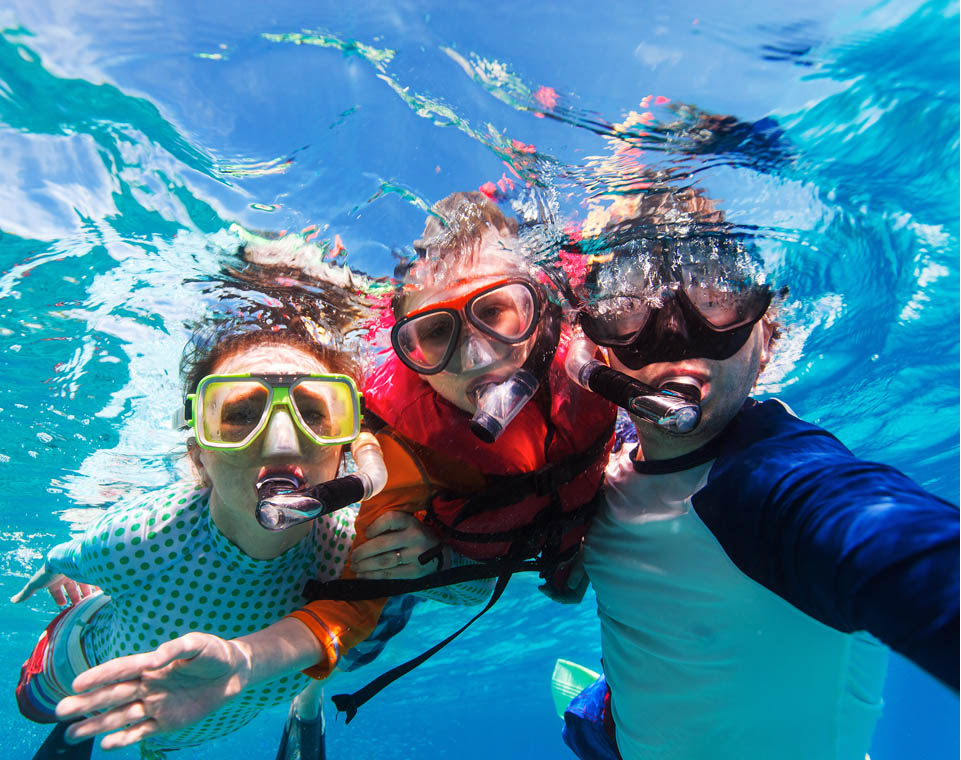 We all know that scuba diving and snorkeling are very relaxing and enjoyable hobbies, but did you ever think that it was good for your health as well? As divers, we don’t hear about the benefits of diving as much as the dangers that scuba diving presents. Does diving actually enhance your well-being?
We all know that scuba diving and snorkeling are very relaxing and enjoyable hobbies, but did you ever think that it was good for your health as well? As divers, we don’t hear about the benefits of diving as much as the dangers that scuba diving presents. Does diving actually enhance your well-being?
Of course it does, and in a variety of ways. Not only is it good for our bodies, it also builds our mental and emotional health.
Here are five major reasons why scuba diving (and even snorkeling!) is good for your health.
Physical Fitness
While diving can aid our well-being in many ways, one of the most important is improving our physical fitness. Fighting currents, swimming around reefs and powering back to the boat are just a few of the exercises that scientists say improve our cardiovascular health and allow us to burn up to 500 calories per hour when scuba diving.
In addition, dive preparation activities such as lifting tanks and weight belts or walking with equipment on strengthens back, leg and arm muscles. Those who dive regularly will see the benefit of both increased muscle mass and less body fat.
Deep Breathing
Controlled, deep breathing is as natural to divers as it is to fish in the water. It’s something we all practice from day 1 as it increases our dive times and reduces the risk of lung expansion injury. This ability has enormous health impacts. First, deep breathing induces a calm state of mind just like in meditation or yoga, giving divers a positive attitude and reducing stress. Scientists even believe slow, controlled breathing can prevent depression or mania.
In addition to mental health benefits, deep breathing also aids us physiologically as well. Not only does this exercise increase lung capacity, strengthen the respiratory system and balance the nervous system, it also increases our oxygen intake. Scientists believe more oxygen in the body stimulates circulation, raises energy levels, and benefits major organ function.
Water Therapy
Many scientists believe there is nothing more relaxing that being submerged in the water. In fact, Dr. John C. Lilly, a neuro-physiologist, invented flotation therapy in 1954. He proved that weightlessness is one way to put the body into a state of total relaxation.
In a similar vein, scuba diving is akin to meditation. Under the water, divers can’t help but clear their mind and focus on the sounds of their breathing. After all, there is not much else to listen to. Both of these effects result in alleviating the body’s stress response and rejuvenating the mind.
The Marine Life Effect
It’s widely accepted that watching fish in a fish tank has a calming effect. Imagine how amplified this must be when we are watching fish in an entire ocean. The appearance of the ease at which marine life floats through life not only relaxes us but also enables positive feelings about our own life.
Furthermore, the colors that we encounter under the water also affect our moods. Bright colors like those found in fish and coral have an uplifting effect whereas cool colors, like the blue of the ocean, have a calming effect. Altogether, the kaleidoscope of colors makes us divers happier people.
A Sense of Community
Nothing makes lifelong friends faster than common interests and shared experiences. It’s likely that you may still keep in contact with your Open Water course classmates. That’s because diving is an exhilarating feeling shared by a very close, but small, community. As such, you are sure to make great friends with fellow divers on every trip and therefore increase your social well-being. In fact, some scientists believe that there is nothing better for preventing mental health disorders than having a good sense of community.
So, there you have it. Scuba diving makes us happier, fitter, calmer and more social people! We’d like to think these advantages massively outweigh any potential dangers scuba diving may present. So grab your fins, don your mask and find your nearest body of water. It’s time to take advantage of these scuba diving benefits!







